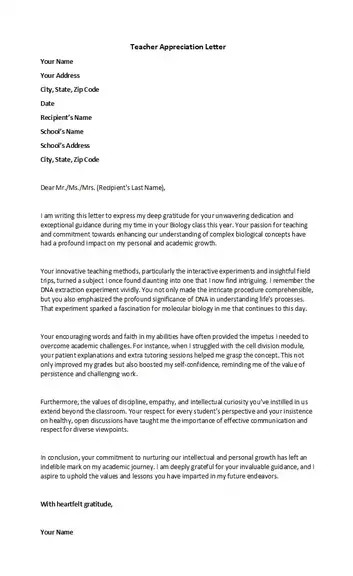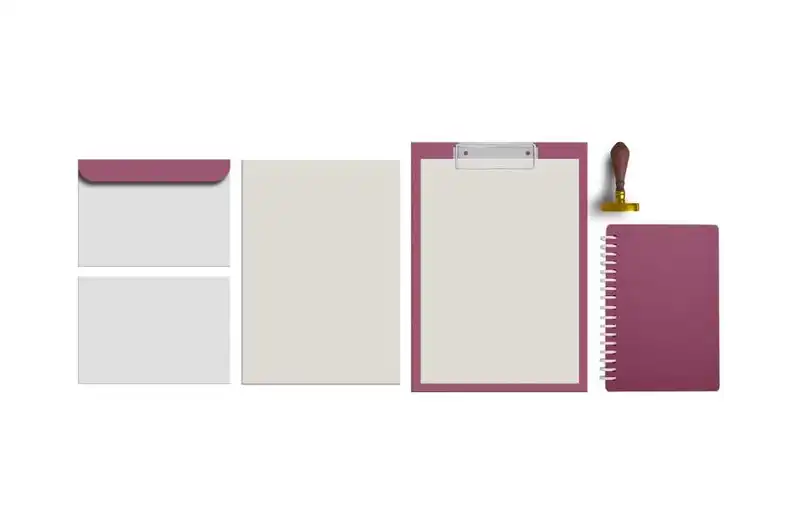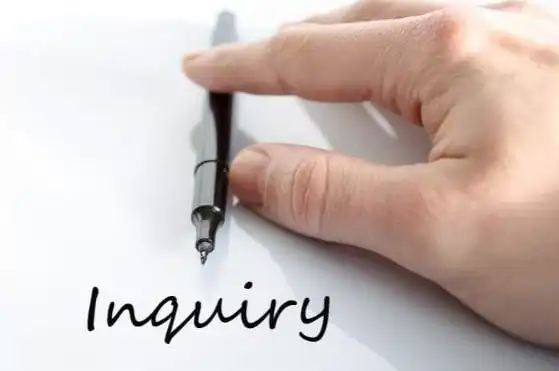Teacher Appreciation Letter: A Comprehensive Guide to Expressing Gratitude – Teacher appreciation, a concept brimming with humility and profound respect, is a testament to teachers’ indispensable role in molding our future. This article will serve as an in-depth guide to writing a Teacher Appreciation Letter, a small yet significant token of gratitude and reverence.
Understanding Teacher Appreciation
Appreciation, in its essence, is an expression of acknowledgment and gratitude for someone’s efforts, and when it comes to teaching, this sentiment acquires profound significance. To appreciate a teacher is to recognize their role as an educator and their influence as mentors, guides, and torchbearers of knowledge.
The Importance of Expressing Gratitude to Teachers
Teachers are architects of society, shaping minds and building futures. Their role goes beyond merely imparting academic knowledge; they instill values, ignite curiosity, encourage creativity, and help mold responsible, thoughtful individuals.
However, the depth and breadth of their contributions often need to be noticed or unexpressed. Therefore, expressing gratitude to teachers is essential—a gesture of respect, recognition, and value. It underscores the acknowledgment of their tireless efforts, commitment, and influence.
Furthermore, expressing gratitude is beneficial for both the receiver and the giver. It instills in students a sense of humility, respect, and empathy, which are integral to their character development.
The Impact of a Teacher on a Student’s Life
The impact of a teacher on a student’s life is vast and multifaceted. From helping students navigate the labyrinth of learning to equipping them with skills to face real-world challenges, a teacher’s influence is integral to their academic and personal development.
They identify and nurture the inherent talents in students, inspire them to reach their full potential and play a significant role in shaping their dreams and aspirations.
Moreover, a teacher’s impact transcends the confines of the classroom. They instill discipline, moral values, and a love for learning, all of which help students evolve into responsible, enlightened individuals.
Understanding teacher appreciation involves recognizing the far-reaching impact teachers have on our lives. It’s about cherishing their contributions, valuing their guidance, and expressing gratitude through words and actions.
Teacher appreciation is a humble acknowledgment of the magnitude of their role and the depth of their influence on our lives.
Why Write a Teacher Appreciation Letter?
Writing a letter can seem antiquated or unnecessary in a world increasingly dependent on instantaneous digital communication.
Yet, when it comes to expressing gratitude, particularly to those who have played a pivotal role in shaping our lives, such as teachers, a written letter holds unparalleled charm and depth.
- Creating a Lasting Impression: A Teacher Appreciation Letter is not just a piece of paper; it is a tangible expression of gratitude, a token of recognition for the tireless dedication that characterizes a teacher’s role. Such a letter can be cherished, revisited, and serves as a lasting reminder of the difference they made in a student’s life. It leaves a lasting impression far beyond the fleeting digital messages of our era.
- Building Stronger Relationships: While appreciation can be shown in many ways, writing a letter adds intimacy and personalization to the act. A letter is a one-on-one communication that creates a personal connection between the writer and the reader. As a student, when you pen your thoughts, recount specific instances, and express your gratitude, you are reaching out to your teacher at a deeper, more emotional level. This can significantly enhance your rapport, building a stronger, more understanding relationship.
When to Write a Teacher Appreciation Letter
- Teacher Appreciation Week: This week, celebrated annually, provides a perfect occasion to pen a heartfelt appreciation letter. It is an opportunity to acknowledge the unparalleled contribution of teachers in shaping our society.
- End of the School Year: As one academic chapter closes, showing gratitude for the guidance provided throughout the year is fitting.
- Significant Milestones: Events such as graduation, acceptance into a higher educational institute, or personal achievements can be a momentous occasion to express gratitude.
Components of a Teacher Appreciation Letter
- Sender’s Information: As with any formal communication, your letter should begin with your name, address, and date.
- Salutation: A proper salutation sets the tone of your letter. It should address the teacher respectfully and appropriately.
- Body: The heart of your letter. This is where you share your sentiments and recount the teacher’s impact on you.
- Complimentary Close and Signature: Conclude your letter gracefully, followed by your signature.
Teacher Appreciation Letter Example

Crafting a Heartfelt Salutation
A salutation should mirror the reverence and respect you feel for your teacher. Choose one that reflects your relationship and is appropriate within the context of your educational institution.
Structuring the Body of the Letter
- An Opening Statement of Appreciation: Open with a sincere statement of gratitude, setting a positive tone for the rest of the letter.
- Detailed Examples of the Teacher’s Impact: Provide specific instances where the teacher has profoundly impacted you. It helps to paint a more vivid and authentic picture of their influence.
- Concluding with Sincere Gratitude: Recapitulate your sentiments and close with a powerful, heartfelt expression of gratitude.
The Art of Closing the Letter
Closing the letter requires finesse. Choose a warm, respectful close like “Yours Sincerely” or “With Gratitude” followed by your name.
In letter writing, closure is an integral part of the composition. It provides a concluding touch to your thoughts, an affirming nod to the sentiments you have woven throughout your letter. Closing a letter of appreciation requires a thoughtful balance of respect, affection, and formality.
First and foremost, the closing salutation should maintain a decorum suitable for the teacher-student relationship. Even when marked by camaraderie and mutual respect, this relationship has an underlying professional context that should not be overlooked. Traditional sign-offs such as “Sincerely,” “Respectfully,” or “Yours Truly” strike the right chord and bring a formal yet warm conclusion to your letter.
Next, it’s worth considering personalizing your closure. For instance, “With warmest regards” or “With heartfelt gratitude” echo the tone of appreciation in your letter. They are not just polite conventions; they underscore your sincerity and reiterate the heartfelt sentiment that characterizes a teacher appreciation letter.
Remember, the closing of your letter is the final impression you leave on your reader, the last note that lingers. It’s worth taking a moment to ensure it encapsulates the tone of your letter, befitting both the content and context of your message.
Last but not least, following your closing with your name is essential. This not only identifies you to the recipient but also provides a personal touch that underlines the genuineness of your sentiments. If the letter is hand-delivered, it’s customary to sign your name for an added touch of personalization.
By adhering to these guidelines, you can master closing your Teacher Appreciation Letter, ensuring it resonates with warmth, respect, and profound gratitude.
Tips for Making Your Letter Stand Out
When penned thoughtfully, an appreciation letter can become a treasured memory for its recipient. Its impact lies not merely in its existence but in its uniqueness and sincerity. Here are some tips to ensure your Teacher Appreciation Letter truly stands out:
Maintain Sincerity and Authenticity
Authenticity is the soul of a truly touching letter. Avoid pretentious platitudes or borrowed words that don’t reflect your true sentiments. The letter should reflect your thoughts, feelings, and personal experience under the teacher’s guidance. Let your words be imbued with sincerity, radiating from every sentence, every phrase. The more unique your letter feels, the more it will resonate with your teacher.
Use Uncommon Adjectives and Descriptive Phrasing
The richness of language lies in its vast vocabulary and expressive potential. To make your letter memorable, eschew commonplace adjectives and phrases in favor of more unique descriptors. For instance, instead of saying a teacher is “good,” you might say they are “insightful,” “compassionate,” or “innovative.” This enriches your letter linguistically and lends depth and precision to your praises, making them more meaningful and heartfelt.
Incorporate Personal Stories and Anecdotes
Nothing brings a letter to life more than stories and anecdotes. When you recount specific instances where the teacher helped you, inspired you, or made a difference in your life, it illustrates their impact more vividly than any abstract praise could. Moreover, personal anecdotes underscore the authenticity of your letter, making it not just another appreciation note but a story of growth, learning, and gratitude.
What to Avoid When Writing a Teacher Appreciation Letter
- Generic and Vague Praises: Avoid cliches and strive for specificity. The praises should be reflective of your unique experiences with the teacher.
- Overuse of Exaggeration: Keep your letter grounded in reality. Over-exaggeration can compromise the sincerity of your message.
- Neglecting Proper Formatting and Grammar: Adherence to proper grammar and formatting underscores respect for the recipient and the act of writing itself.
Checking and Revising Your Letter
Proofread your letter carefully, ensuring correct grammar and formatting and conveying your heartfelt appreciation.
Delivering the Letter: Adding a Personal Touch
The way you deliver your letter can enhance its sentiment. Hand-deliver the letter, mail it with a thoughtful stamp or pair it with a small token of appreciation for an extra touch of gratitude.
Conclusion
A Teacher Appreciation Letter is not just a note of thanks; it’s a testament to a teacher’s indelible imprint on a student’s life. Take time to express your gratitude sincerely and thoughtfully, and you’ll craft a letter your teacher will treasure for years.


